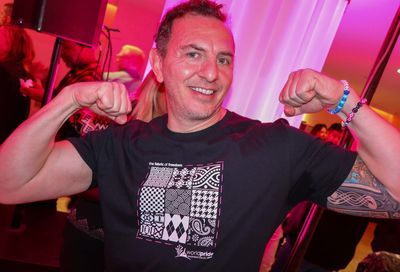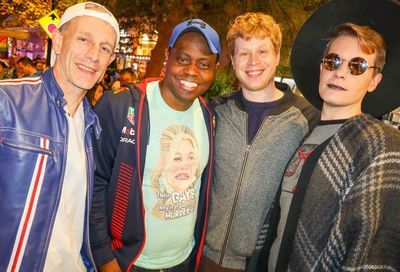Swishbuckling
The 'Pirates of the Caribbean' sequel succeeds brilliantly at its misson to entertain us with a big, brazen Yo-Ho-Ho and a bottle of rum
When Pirates of the Caribbean: Curse of the Black Pearl drifted into theaters three summers ago, few — least of all myself — expected it to be a very good movie, let alone a great movie. After all, it had two enormous strikes going against it: It was based on a Walt Disney theme-park ride and it was about pirates, a subject that has traditionally bombed at the box office. To be involved with a pirate movie could spell doom for your career. Has anyone heard from Christopher Atkins since 1982’s musical The Pirate Movie? And poor Geena Davis took years to recover from the scarlet smudge left on her resume by 1995’s Cutthroat Island. Pirates of the Caribbean could have easily been a very expensive disaster.
Of course, we all know how that tale turned out. Black Pearl was one of 2003’s monster hits, mainly because it had all the right stuff — a skilled director (Gore Verbinski); an entertaining, supernatural-fortified plot that managed to incorporate iconic moments from Disney’s animatronic water ride; and the most idiosyncratic, inventive, fearless actor working in Hollywood, Johnny Depp, who gave an unexpected joy of a performance as Captain Jack Sparrow, a swishbuckling scoundrel with a heart of — well, if not exactly gold, then at least gold-plating. Depp’s Oscar-nominated, offbeat portrayal helped launched Black Pearl into a box-office bonanza stratosphere that took most of Hollywood by surprise.
 |
Now here’s the tricky part. We went into the first Pirates expecting the worst, and came out feeling that we actually, for once, got our money’s worth out of a movie. Going into the sequel — Pirates of the Caribbean: Dead Man’s Chest — is a different story. Our expectations are raised. This movie had better deliver. Big.
Happily, it more than delivers. Dead Man’s Chest is every bit as terrific as the inaugural film. In fact, it occasionally surpasses it with mind-boggling, spectacularly choreographed action set pieces. Despite the narrative formula to which it must adhere, it still manages to surprise us, tickle us, make us gasp in awe.
The basic story has to do with Captain Jack owing a blood debt to Davy Jones (Bill Nighy), the octopus-headed, lobster claw-handed captain of the Flying Dutchman, who arrives from the depths to claim Jack for a century of servitude. Jack can avoid a waterlogged fate if he and the Black Pearl’s skeleton crew — which now includes two of best comic characters from the first movie, the previously undead Ragetti and Pintel (Mackenzie Crook and Lee Arenberg) — can find a hidden chest that contains an item which can defeat Davy Jones and the slippery, slimy crew of sea phantoms he commands. But there is another party who wants what’s in the chest. As he says, ”With it, you can control the sea,” not to mention the Kraken, a sea-dwelling, ship-pulverizing leviathan.
Meanwhile, Will Turner (Orlando Bloom) and fiancé Elizabeth Swan (Keira Knightley) are put under arrest for helping Jack in the first movie. A series of refreshingly complicated circumstances find the trio united by the movie’s final hour. And it’s at that point things take off and never let up.
There’s no hiding the debt Dead Man’s Chest owes — at least structurally — to George Lucas’s Empire Strikes Back. Jack is Han Solo, Will is Luke, Elizabeth is Leia, Ragetti and Pintel are R2D2 and C-3PO, Davy Jones is Darth Vader. Okay, so there’s no Wookie, but there is a visit to a sage in a swamp, an unexpected reunion with a father (Will meets his undead dad, legendary pirate Bootstrap Bill Turner, played with marvelous melancholy by Stellan Skarsgard), and the whole shebang ends on an unresolved note with a significant cliffhanger. (Luckily, we’ll know how it all ends up next summer, with the trilogy’s big finish, Pirates of the Caribbean: At World’s End.)
|
It’s hard not to admire Verbinski’s skill with alarmingly improbable action set pieces. A three-way swordfight on a beach quickly morphs into a wild cling-n-clang atop a runaway waterwheel. Earlier, Jack, tied to a spit, escapes cannibal captors with the aid of tropical fruits in a Wile E. Coyote-inspired sequence that is as funny as it is thrilling. Verbinski’s instinctive command of momentum and build, his gift for juggling multiple scenarios simultaneously, place him in a rare category of filmmaker, one occupied by an elite few, including Steven Spielberg, Peter Jackson and Sam Raimi.
While it’s unlikely Depp will get an Oscar nod this time around, his performance is every bit as rich and unique as it was in the first film. In Jack Sparrow, Depp has created a heroic anti-hero, a man defined by his absolute lack of loyalty to anyone but himself. And he tosses off his rum-soaked lines as though they were priceless doubloons: When pressed by Elizabeth to ”do the right thing,” he slurs, ”I love those moments. I like to wave at them as they pass by.”
Knightley and Bloom have less to do this time around and seem a little bland (hopefully that will change in the third installment). But Crook and Arenberg are rascally little scene-stealers, and Kevin McNally is wonderful as Gibbs, Jack’s right hand man. But the real treasure is Nighy’s Jones. Beneath a ton of latex and CGI effects, Nighy manages a graceful, eloquent performance — one that transcends the supernatural aspects of the character and makes Jones come across as a genuinely dangerous, evil-minded presence. It’s pretty much what Geoffrey Rush did with the cursed Captain Barbossa in the first film, but on a much grander, far more insidious scale.
Emotionally, Dead Man’s Chest rarely strays from the shallowest of waters. But that doesn’t make it any less involving or us any less invested in the welfare of the characters. Its mission is to do one thing, and to do it flawlessly: Entertain us with big, brazen Yo-Ho-Ho and a bottle of rum.
Support Metro Weekly’s Journalism
These are challenging times for news organizations. And yet it’s crucial we stay active and provide vital resources and information to both our local readers and the world. So won’t you please take a moment and consider supporting Metro Weekly with a membership? For as little as $5 a month, you can help ensure Metro Weekly magazine and MetroWeekly.com remain free, viable resources as we provide the best, most diverse, culturally-resonant LGBTQ coverage in both the D.C. region and around the world. Memberships come with exclusive perks and discounts, your own personal digital delivery of each week’s magazine (and an archive), access to our Member's Lounge when it launches this fall, and exclusive members-only items like Metro Weekly Membership Mugs and Tote Bags! Check out all our membership levels here and please join us today!






















